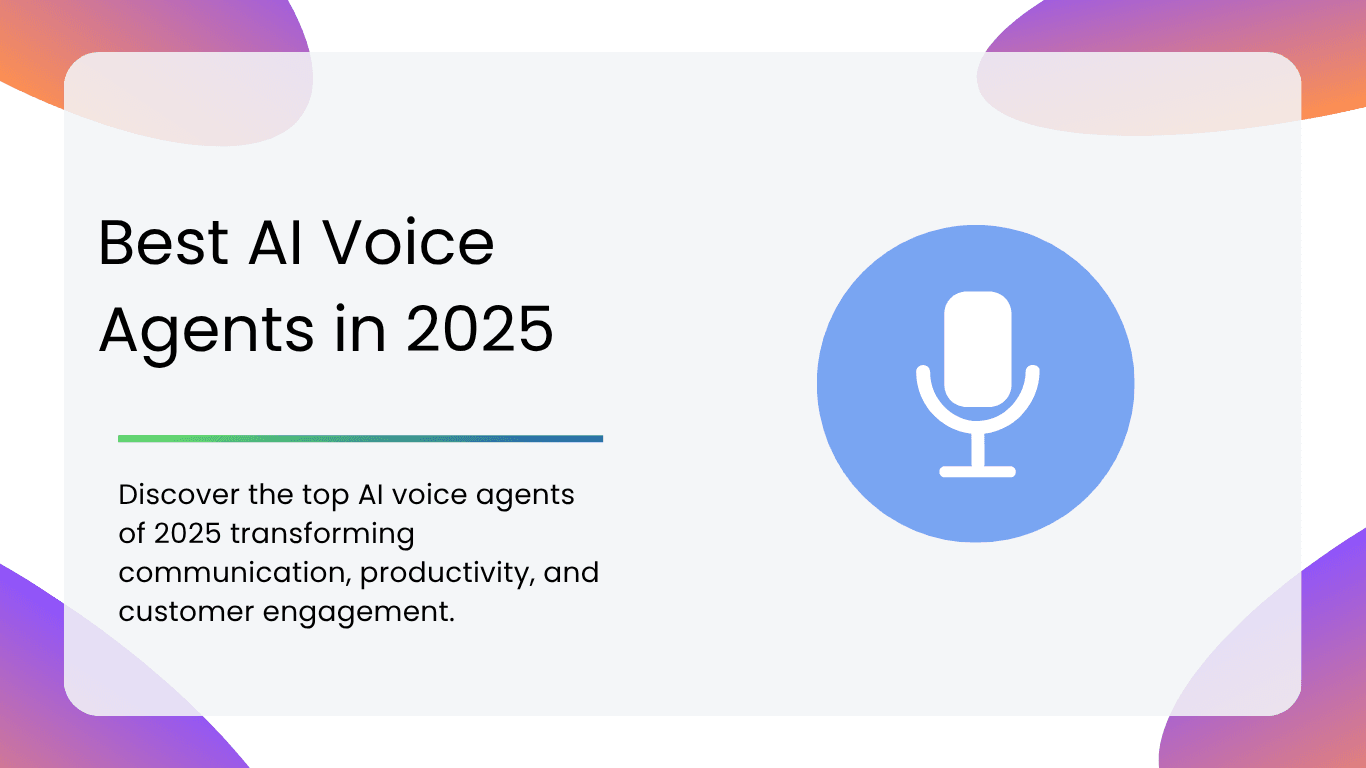AI voice agents are now a normal part of life. You talk, they listen, and they answer with a clear, real-sounding voice.
In 2025, these agents do more than just simple replies. They turn your speech into text in seconds, figure out exactly what you mean, and give the right answer or action without delay.
You find them on phone lines, websites, apps, and smart devices, helping to book appointments, answer questions, solve problems, and even hold full conversations.
They work in shops, banks, hospitals, and homes, helping people get what they need without waiting.
As they keep learning, the top AI voice agents save time, reduce mistakes, and make conversations easy for anyone.
What are AI Voice Agents
AI voice agents are smart computer programs that talk with people in a natural way. They listen to your words, understand what you mean, and give clear spoken replies or actions.
Unlike old phone systems that only let you pick numbers, voice agents can handle full conversations and remember the topic.
They answer questions, book appointments, offer help, and can even transfer you to a human if needed.
Many now work in real time on calls, apps, or smart devices, making talking to tech much easier.
Why AI Voice Agents Are Important in 2025
- Available Anytime, Anywhere: AI voice agents can work 24 hours a day, seven days a week, making sure users get help whenever they need it without waiting.
- Cut Costs and Save Time: They handle many calls and tasks automatically, reducing the need for large support teams and saving money.
- Faster and Smarter Responses: Voice agents respond instantly, understand complex requests, and remember details better than older systems.
- Support for More Languages: They speak many languages and accents, making it easier to help customers from all over the world.
- Consistent Quality Service: Unlike humans, they provide the same level of care every time, without getting tired or distracted.
What to Consider When Choosing an AI Voice Agent
- Speech Understanding Accuracy: The agent should understand different accents and ways of speaking without errors.
- Natural and Clear Voice: Choose agents with voices that sound real, friendly, and easy to listen to.
- Integrations and Setup: It should connect smoothly with your current software and be simple to set up.
- Privacy and Security: Make sure it protects customer data and follows all rules for handling personal info.
- Scalability and Speed: Pick agents that can handle many users at once and don’t slow down during busy times.
Best AI Voice Agents at a Glance
| Tool Name | Best For | AI Features |
| ElevenLabs | Creating human-like, emotional, and multilingual voices | Emotional tone control, voice cloning, and multi-language voice synthesis |
| Cognigy | Building multichannel conversational agents across chat and voice | Visual flow builder, context memory, integration with CRM, and API-based automation |
| Talkdesk | AI-powered call center automation and analytics | Smart call routing, live analytics, natural voice interaction |
| Deepgram | High-accuracy real-time speech recognition for developers | Instant speech-to-text, background noise handling, and keyword spotting |
| PolyAI | Handling complex, natural business conversations | Context retention, long-dialogue management, and multi-accent understanding |
| Lindy | Quick deployment of voice agents for customer calls without coding | Natural voice generation, no-code builder, data privacy controls |
| Vapi AI | Automated multilingual customer and sales calls | Instant speech understanding, task-specific training, performance analytics |
| Bland AI | Affordable automation for small businesses | Simple call flows, meeting scheduling, and secure data handling |
| Synthflow | Building flexible AI voice agents for global customer support | Text-to-speech and speech-to-text synergy, multi-language coverage |
| OpenAI Whisper | Accurate speech recognition across accents and languages | Multilingual transcription, open-source adaptability, developer APIs |
Table of Contents
| 1. ElevenLabs |
| 2. Cognigy |
| 3. Talkdesk |
| 4. Deepgram |
| 5. PolyAI |
| 6. Lindy |
| 7. Vapi AI |
| 8. Bland AI |
| 9. Synthflow |
| 10. OpenAI Whisper |
Best AI Voice Agents in 2025
1. ElevenLabs
ElevenLabs is a leading AI voice technology platform known for creating speech that sounds very close to a real human voice. It uses advanced artificial intelligence to generate voices that not only speak clearly but also add emotions like happiness, sadness, or excitement. This makes the voices feel alive and natural, a big step above robotic text-to-speech systems. The platform supports over 70 languages and offers thousands of voice options, including the ability to create custom voices from a few seconds of audio. This versatility suits various use cases, from audiobooks and podcasts to virtual assistants and game characters. ElevenLabs also provides easy-to-use APIs and SDKs so developers can add this lifelike voice technology into their own applications quickly. It is built with low latency, meaning the voices respond fast, and strong security to protect user data.
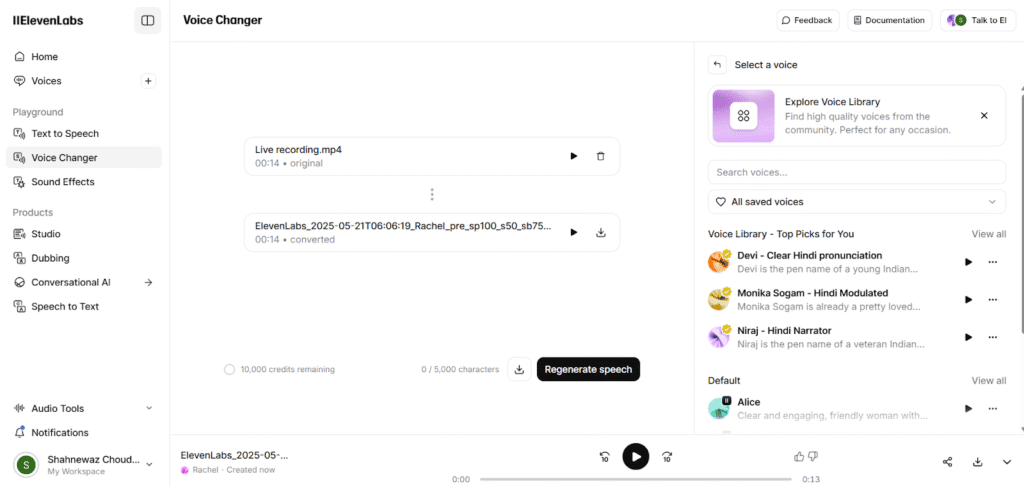
Key Features
- Human-Like Speech Synthesis: Generates clear, smooth, and expressive voices that include natural tone, pacing, and emotional cues.
- Multilingual Support: Speaks over 70 languages and dialects, useful for global projects.
- Custom Voice Creation: Allows users to create unique voices by cloning a person’s voice or designing new voice styles.
- Developer-Friendly API: Offers simple API and SDKs for easy integration into websites, apps, and devices.
Pros
- Voices sound very natural and emotional, improving listener engagement.
- Wide language options make it useful worldwide.
- Easy to integrate into many platforms with APIs.
- Real-time voice generation with low delays.
Cons
- Primarily focused on voice creation, not full voice agent features.
- It can be expensive for heavy users or advanced custom voices.
- Requires good internet and hardware for best results.
2. Cognigy
Cognigy is a full conversational AI platform that combines voice, text, and messaging to build smart virtual agents. It helps businesses automate customer support and workflows by understanding what users say and replying naturally. Cognigy’s AI can remember previous parts of a conversation and pull information from business systems like payment or CRM tools. The platform lets users design conversations visually without coding, making it easier to create complex dialogs. Many companies choose Cognigy to modernize call centers, speed up help desks, and deliver quick, accurate answers across chat and voice channels.
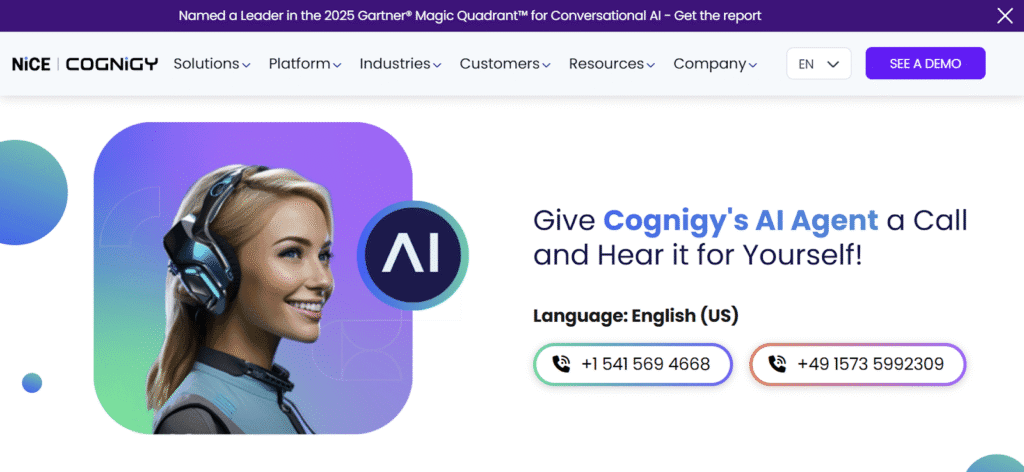
Key Features
- Multichannel Support: Handles voice calls, chatbots, and messaging apps all in one platform.
- Natural Language Understanding: Detects user intent and context to provide relevant and accurate responses.
- Business Integration: Connects with databases, customer service software, and backend systems.
- Visual Flow Builder: Drag-and-drop tools let users design conversations easily without coding.
Pros
- Supports voice and chat for better customer experiences.
- Powerful tools for automating support and business tasks.
- Easy to use for teams without programmers.
Cons
- Platform complexity means some training is needed.
- Pricing may be too high for smaller businesses.
- Setup and integration require time and effort.
3. Talkdesk
Talkdesk is a cloud-based call center solution that uses AI voice agents to improve call handling and customer interactions. It automates tasks like answering common questions, routing calls to the right agent, and collecting information. Talkdesk’s AI voice agents allow businesses to reduce wait times and provide faster service without losing the human touch. The platform also offers analytics to monitor call quality and integrates smoothly with customer relationship software, helping agents deliver more personalized support. Talkdesk is popular among companies wanting a complete call center system powered by AI.
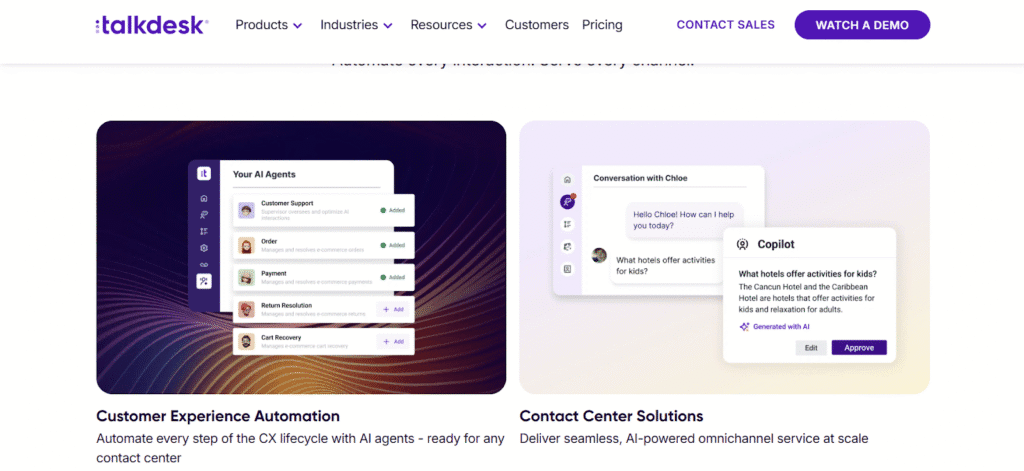
Key Features
- AI Virtual Agents: Use AI to answer calls and hold conversations naturally.
- Intelligent Call Routing: Direct calls to the right person or AI agent quickly.
- Speech Analytics: Monitors calls to improve service quality and agent performance.
- CRM Integration: Connects with customer data for personalized conversations.
Pros
- Great for improving call center efficiency and speed.
- Works well with many CRM systems.
- Provides useful insights with analytics.
Cons
- Mainly suited for call center use, less for other tasks.
- Setup can be complex for advanced needs.
- Cost can be high for small companies.
4. Deepgram
Deepgram focuses on speech recognition and transcription powered by AI. It converts spoken words into text with high accuracy and speed, even in noisy environments. This makes it great for building voice agents that rely on recognizing what users say quickly and clearly. Deepgram supports real-time voice processing, keyword spotting, and speaker identification. Developers use Deepgram’s APIs and SDKs to add voice reading and transcription to apps, call centers, and voice assistants. While it does not provide full voice agents on its own, it forms an essential part of many AI voice systems by turning speech into readable data.
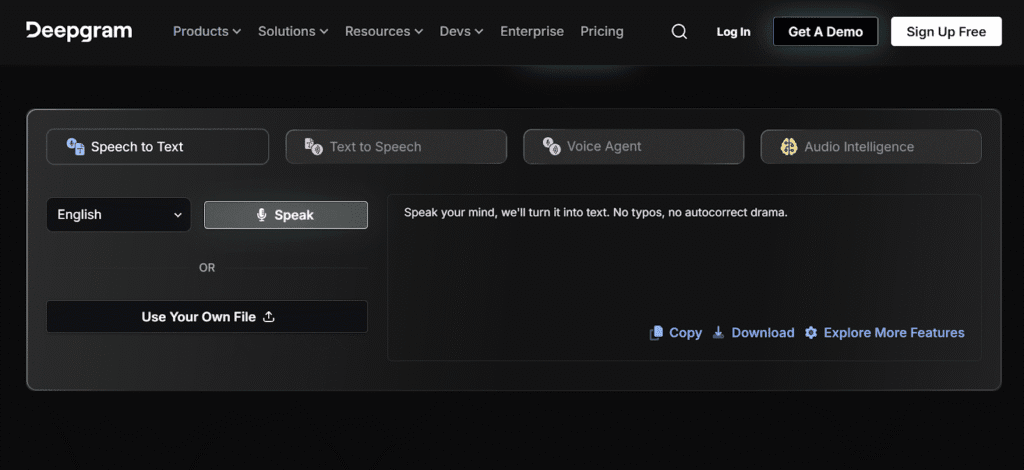
Key Features
- High Accuracy Speech-to-Text: Transforms speech into text correctly, handling background noise well.
- Real-Time Processing: Transcribe audio instantly for live applications.
- Custom Keyword Spotting: Detects important words or phrases quickly.
- Developer APIs: Simple tools for building voice-related apps and services.
Pros
- Best-in-class accuracy and speed for transcription.
- Valuable for voice commands and audio data extraction.
- Strong tools for developers to build voice apps.
Cons
- Not a full AI voice agent solution by itself.
- Needs other systems for voice replies and conversations.
- Focused more on text conversion than on natural responses.
5. PolyAI
PolyAI is an AI voice platform known for creating highly natural and intelligent voice assistants. It focuses on understanding conversations deeply to provide accurate, helpful, and timely responses. PolyAI’s technology is designed to handle long, complex calls just like a human would, often used in customer services, booking, and support centers. The platform uses advanced speech recognition and natural language processing to keep dialogues flowing smoothly and remembers previous conversations to answer better. It also supports multiple languages and accents, making it useful for global businesses.

Key Features
- Advanced Conversational Understanding: Uses deep learning to grasp user intent even in complex conversations.
- Long-Form Dialogue Handling: Keeps context over long calls for natural and helpful exchanges.
- Multilingual and Multilingual Support: Speaks many languages and understands different accents.
- Easy Integration: Connects with existing call center infrastructure and CRMs.
Pros
- Handles complex, natural conversations well.
- Good multilingual support.
- Fits customer support and service use cases.
Cons
- Setup can be technical and time-consuming.
- Pricing varies based on call volume and feature set.
- Best for medium to large businesses.
6. Lindy
Lindy is a cloud-based AI voice agent platform that blends realistic speech with fast, responsive AI. It is designed for businesses that want quick automation of customer calls or virtual assistants across SMS, phone, and web chat. Lindy offers simple no-code tools to create and customize voice agents without heavy programming. It focuses on understanding natural speech and giving clear responses. The platform supports GDPR compliance and keeps user data secure, making it popular in Europe and growing globally.

Key Features
- Natural Voice Dialogues: Converts speech to text and back with clear and human-like voices.
- No-Code Agent Builder: Create and adjust voice agents visually without coding skills.
- Multichannel Delivery: Handles conversations over phone, SMS, and chat apps.
- Privacy and Compliance: Ensures user data is safe and meets legal standards.
Pros
- Easy to build and launch voice agents fast.
- Good voice quality and natural interaction.
- Strong focus on privacy and security.
Cons
- Limited advanced AI features for very complex calls.
- It may not suit very large enterprises.
- Some integrations require extra setup.
7. Vapi AI
Vapi AI is an AI voice platform focused on automating customer service and sales calls globally. It provides voice agents that sound natural and work well in many languages. Vapi AI uses real-time speech understanding to respond instantly and can be trained for specific tasks like appointment setting or survey collection. The platform provides analytics and tools to improve agent performance. Vapi AI fits businesses of various sizes and offers easy API access for custom solutions.
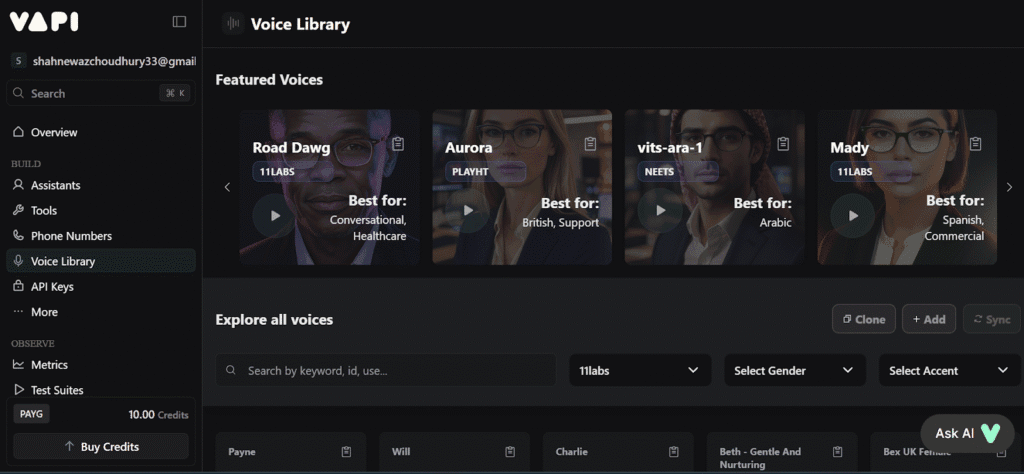
Key Features
- Real-Time Speech Understanding: Instantly converts voice into text to respond quickly.
- Natural and Multi-language Voices: Supports many languages with clear, natural-sounding voices.
- Task-Specific Training: Customize voice agents for different business needs, like sales or support.
- Performance Analytics: Offers data on call success and agent behavior.
Pros
- Good for automating customer conversations worldwide.
- Supports multiple languages clearly.
- Easy to train and customize.
Cons
- May need technical help for setup and training.
- Features vary by plan and pricing.
- Not a full voice agent, but it works well with partners.
8. Bland AI
Bland AI is a simple AI voice agent built for small to medium businesses that want affordable voice automation. It uses easy-to-understand voices and basic conversation flows to answer questions, route calls, and book meetings. Bland AI is designed for quick setup with minimal training and puts privacy first with secure data handling. It is ideal for businesses starting with voice automation or those needing straightforward voice assistants without complex features.
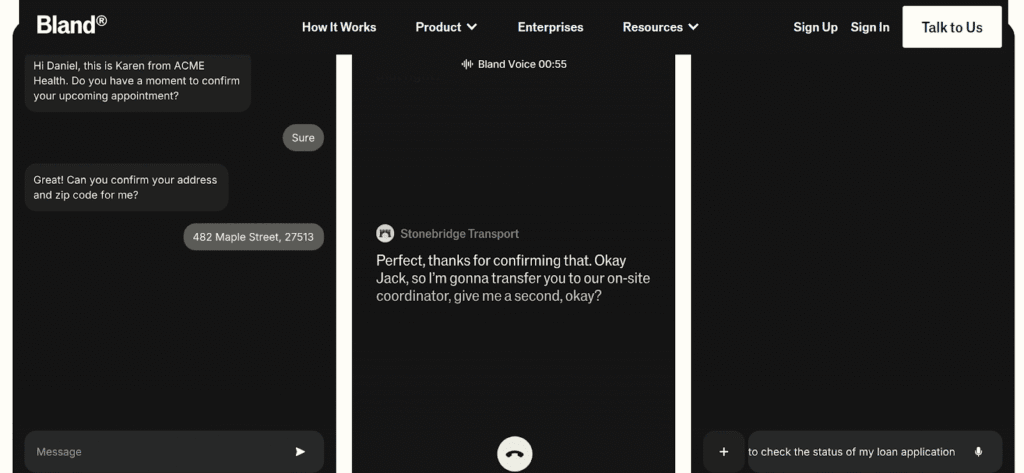
Key Features
- Simple Voice Automation: Handles calls with easy voice replies and fixed response flows.
- Quick Setup: Launch voice agents fast without coding.
- Secure Data Handling: Maintains user privacy and complies with data protection laws.
- User-Friendly Interface: Manage agents using simple dashboards and controls.
Pros
- Affordable and easy for beginners.
- Focus on security and privacy.
- Good for basic customer support needs.
Cons
- Limited to basic conversation functions.
- Not suited for complex dialogue or heavy call volume.
- Fewer customization options.
9. Synthflow
Synthflow is a modern AI voice platform focused on creating reliable and flexible voice agents. It excels in converting text to natural-sounding speech and understanding spoken languages with high accuracy. Synthflow supports multiple languages and can be used for customer support, virtual assistants, and interactive voice response(IVR) systems. The platform allows businesses to build voice agents that respond quickly and smartly in real-time. With easy integration options, Synthflow fits companies wanting to add speech capabilities to apps, call centers, or devices.
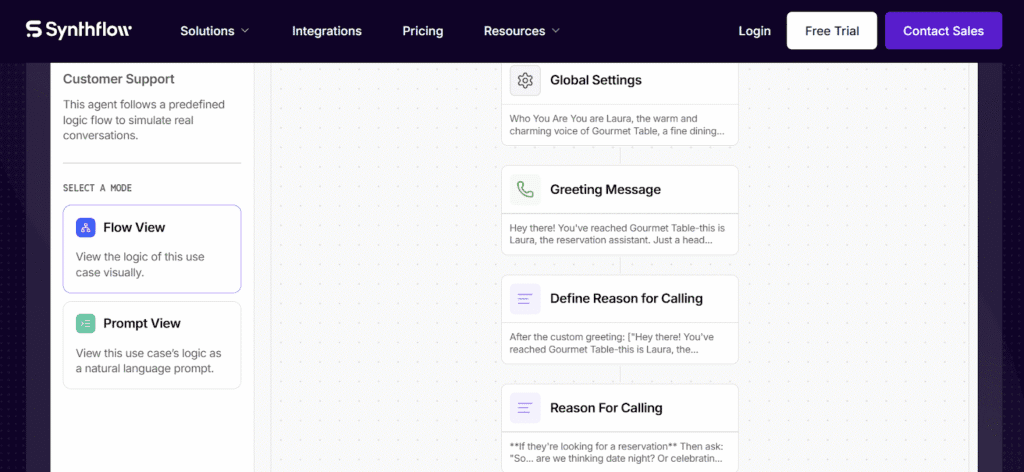
Key Features
- Accurate Speech Recognition: Quickly converts spoken words into text with minimal errors, even in noisy places.
- Natural Text-to-Speech: Produces smooth and clear voices that sound natural and easy to understand.
- Multi-Language Support: Handles many languages and accents for global reach.
- Easy API Integration: Offers simple APIs to connect voice features with your existing software.
Pros
- Good accuracy in recognizing speech.
- Natural, clear voices for better communication.
- Works well across different languages.
Cons
- Not a full conversational agent on its own.
- Requires integration with other systems for full voice AI.
- Less focus on advanced dialogue management.
10. OpenAI Whisper
OpenAI Whisper is a powerful open-source speech recognition system designed to transcribe and understand spoken language. It excels at converting speech into written text with high accuracy and can recognize many languages and accents. Whisper is widely used by developers to add speech-to-text capabilities to apps, research, and automation tools. While it doesn’t provide voice synthesis or full voice agent functions, it plays a key role in turning spoken words into text that other AI systems use to respond properly. Its open nature makes it accessible for custom projects and innovation.
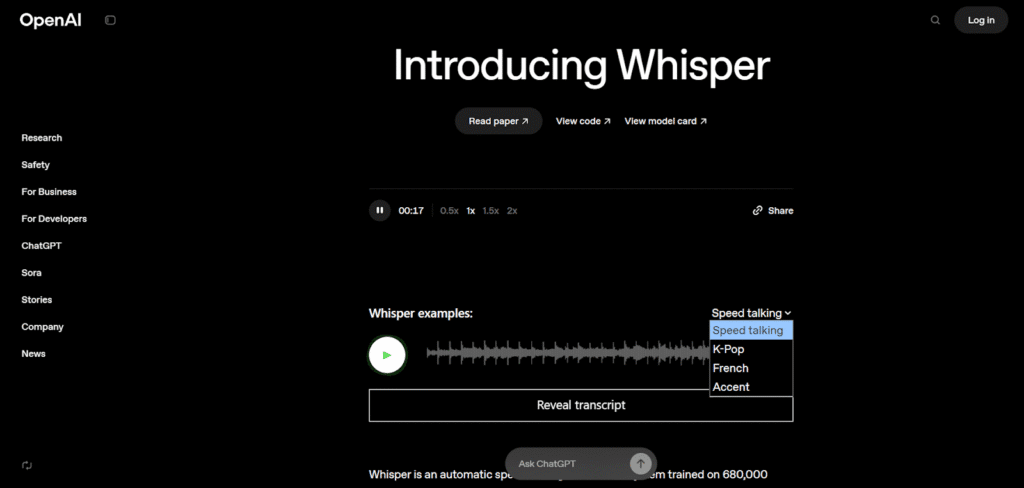
Key Features
- High-Quality Speech-to-Text: Delivers accurate transcription even in noisy environments or with varying accents.
- Multilingual Recognition: Supports a broad range of languages and dialects for global applications.
- Open-Source Flexibility: Free to use and modify for specific use cases and custom development.
- Developer Friendly: Easy to integrate into apps with many programming languages and libraries.
Pros
- Very accurate and reliable transcription.
- Supports many languages and accents well.
- Open source with flexibility for customization.
Cons
- No built-in voice generation or interaction features.
- Needs pairing with other tools for full voice assistant use.
- Requires technical skills for deployment and tuning.
Future of AI Voice Agents
- Natural Conversation Recognition: AI voice agents will move beyond simple commands and use advanced language models to understand context, intent, and tone, creating fluid and intuitive conversations for users.
- Emotional Intelligence Integration: Systems will detect emotions in speech and adapt responses to match the user’s mood, making interactions more supportive and personal.
- Real-Time Multilingual Adaptation: Voice agents will enable seamless, instant translation across dozens of languages, breaking communication barriers in global settings.
- Proactive User AssistaNatural Conversation Recognition: nce: AI will analyze previous interactions and predict user needs, providing solutions or updates before the user asks.
- Immersive Technology Expansion: New applications will blend AI voice agents with AR, VR, and smart environments, building richer, more interactive experiences for users.
Conclusion
AI voice agents are no longer just futuristic ideas. They are the voices behind smooth talks, helpers who never sleep, and the connection between people and technology.
As they grow smarter, these agents do more than answer. They listen and make every chat easy and natural.
Choosing to use them means stepping into a future where talking gets simpler, problems get solved faster, and the impossible feels close.
The future speaks. Are you ready to hear it?
Check out other blogs for more such informative content:
- Top 10 AI tools to generate AD copies
- Top AI Tools for Influencer Marketing
- 10 Creative AI Design Assistant Tools for Marketers
- AI in Design: Use Cases, Best Tools & Future of AI Design
FAQs
Many AI voice agents follow strict data protection laws like GDPR, but the level of security varies by platform. Always confirm encryption and data storage policies before using them.
No. They improve speed and handle routine tasks, but complex or emotional cases may still need human support for context-based reasoning.
Most AI voice agents need a stable broadband connection of at least 5 Mbps for low-latency voice streaming and response times under one second.
Platforms like ElevenLabs and PolyAI allow deep tuning, including emotional tone and accent control, while simpler tools such as Bland AI offer more limited adjustments.

